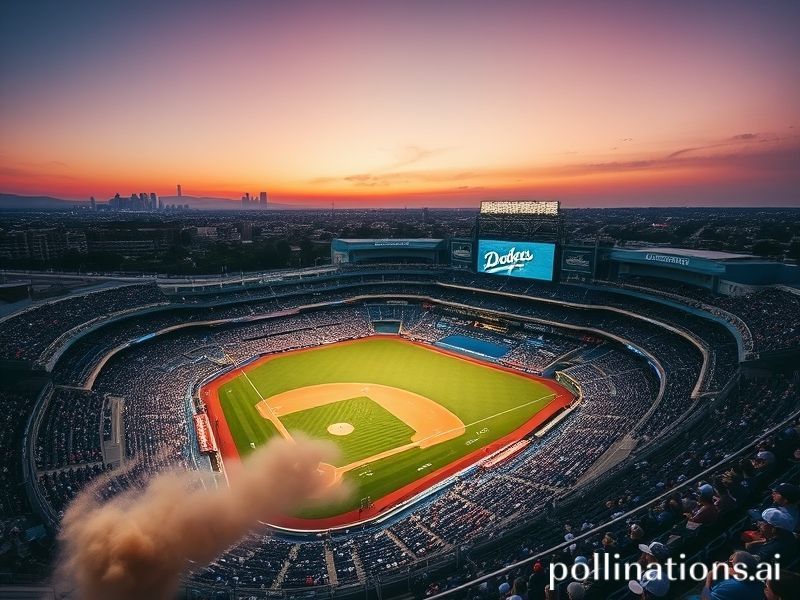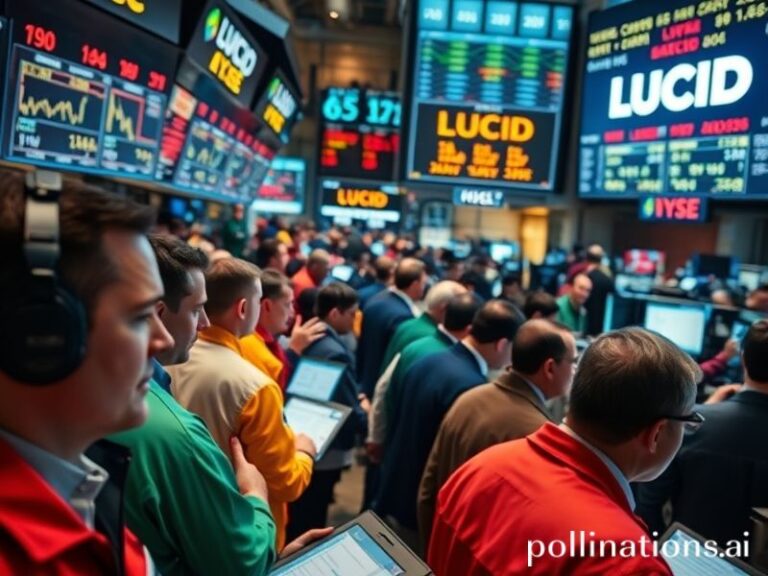Dodgers Games: How L.A.’s Pastime Became the World’s Guilty Pleasure
Dodgers Games: The Global Circus Where Baseball Meets Geopolitical Theater
By Our Correspondent Who’s Seen More Bullpens Than Bull Markets
LOS ANGELES—While the rest of the planet obsesses over missiles, microchips, and methane, 53,000 sunburned pilgrims still shuffle into Chavez Ravine each night to watch grown men in pajamas swing sculpted lumber at a sphere of imported cowhide. Dodgers games, once a provincial Californian ritual, have quietly become the most dependable export the United States still produces without a congressional hearing. From Lagos sports bars streaming 3 a.m. first pitches to Tokyo office workers praying Shohei Ohtani homers on company VPNs, the Dodgers brand now travels farther than most American diplomats—and arguably accomplishes more.
Consider the supply chain: the baseballs themselves are hand-stitched in Costa Rica by workers earning roughly the price of a Dodger Dog per hour, then flown to Los Angeles, where they’re rubbed with Delaware River mud—because apparently only Mid-Atlantic silt can achieve the proper grip. Somewhere, a U.N. subcommittee on labor standards is screaming into a pillow. The bats? Northern white ash harvested in Pennsylvania, shipped to China for lacquering, returned stateside, and occasionally weaponized against fastballs and water coolers alike. If you ever need a metaphor for late-stage capitalism, picture a $300 million slugger splintering a communally finished club over a slider that cost less than the stadium beer spilled in celebration.
Globally, the Dodgers function as a floating currency. When the Argentine peso hyperventilates, a signed Mookie Betts jersey in Buenos Aires still holds value better than the local savings account—plus you can wear it to court during your bankruptcy hearing. In South Korea, gamblers bet blockchain tokens on Clayton Kershaw’s curveball with the solemnity of derivatives traders, proving that human beings will wager on anything that moves, including a 93-mph metaphor for their own mortality.
The geopolitical subplot is richer than the ballpark nacho cheese. The Dodgers’ roster currently reads like a U.N. roll-call interrupted by a mariachi band: Japanese two-way phenom, Mexican sluggers, Cuban defectors, Canadian relief pitchers who apologize after strikeouts. Management scouts the Caribbean like it’s still 1898 and someone left the door open to the Monroe Doctrine. Every home run is a tiny immigration success story; every strikeout, a reminder that even dreams with multimillion-dollar signing bonuses can whiff on a back-door slider.
Meanwhile, the broadcast feed beams into U.S. military bases in Ramstein and Okinawa, where homesick Marines argue over whether the new electronic signboard in left field constitutes progress or sacrilege. Nothing says “spread of democracy” quite like forcing 19-year-old soldiers to stay up past midnight watching seventh-inning stretches sponsored by a cryptocurrency exchange currently under SEC investigation.
Back home, Los Angeles itself treats the Dodgers as municipal Prozac. City Hall could be on fire (and occasionally is), yet if the boys in blue are winning, the inferno becomes mere background lighting for Instagram. The team’s ownership—an investment consortium that includes Magic Johnson and whichever private-equity titan last checked his conscience at the door—has mastered the art of monetizing hope. Ticket prices inflate faster than Turkish inflation, parking costs more than a monthly subway pass in Paris, and still the crowds come, because nothing suppresses existential dread quite like a walk-off double in extra innings.
Environmentalists calculate that each night game consumes enough electricity to power 2,800 Sri Lankan villages, but hey, the stadium installed LED bulbs and a vegan stand, so consider the carbon ledger balanced. Climate change may render the planet unlivable by the seventh-inning stretch of this century, but at least we’ll have biodegradable straws with which to toast the end.
In the end, Dodgers games are less a sporting event than a planetary confession booth: we know the world is burning, the supply chains are immoral, and the owners would sell the bleachers for scrap if EBITDA looked better. Yet we keep showing up, praying for a small sphere to arc into the night sky, momentarily defying gravity, debt, and the inevitable decline that awaits us all—usually right after the closer blows the save.
Play ball, comrades. The apocalypse can wait for the off-season.







